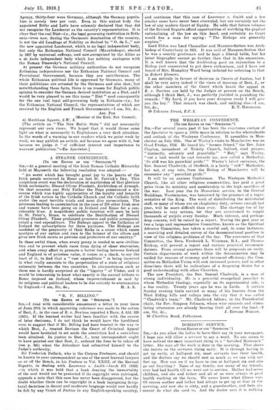" R. V. BILLING."
[To THE EDITOR OF THE " SFECTATOR."3 read with considerable amazement a letter in your issue of June 29th in which approving reference was made to the action of Best, J., in the case of R. v. Davison reported 4 Barn. & Ald. 329 (1821). If the learned writer had been familiar with the course of later decisions, I do not think he would have the hardihood even to suggest that if Mr. Billing had been treated in the way in which Best, J., treated Davison the Court of Criminal Appeal would have hesitated to set aside the conviction had a conviction been obtained. In justice to Best, J., your correspondent ought to have pointed out that Best, J., ordered the fines to be taken off (see p. 341) when the defendant had submitted himself to the Judge's authority.
Sir Frederick Pollock, who is the Corpus Professor, and should be known to your correspondent as one of the most learned lawyers on or off the Bench, in his Preface to Vol. XXIII. of the Revised Reports, in dealing with Lawrence v. Smith—Jacob 471 (1822) —in which it was held that a book denying the immortality of the soul would not be protected if its copyright were infringed, appends a note that this case has never been disapproved, but the doubt whether there can be copyright in a book impugning Scrip- tural doctrines in decent and moderate language would now hardly be felt by any Court of Justice in any English-speaking country,
and continues 'that this case of Lawrence v. Smith and a few similar cases have never been overruled, but are certainly not the law of any modern Court of Equity. He adds that future volumes of the Revised Reports afford opportunities of watching the gradual rationalizing of the law on this head, and certainly no Court would fine a man for saying : " The Bishops are generally sceptics."
Lord Eldon was Lord Chancellor and Manners-Sutton was Arch- bishop of Canterbury in 1821. It was said of Manners-Sutton that he was a courtly gentleman and he kept a liberal table, but his latest biographer cannot go further than that in his encomium. It is well known that the Archbishop gave an injunction to a Bishop just consecrated to put down enthusiasm, and I have not heard of Mrs. Humphry Ward being indicted for referring to that in Robert Bismere.
I am entirely in favour of decorum in Courts of Justice, but I shall be very sorry indeed if the views of decorum of Best, J., or the other members of the Court which heard the appeal in R. v. Davison are held by the Judges at present on the Bench, although I think Best, J., was perfectly justified in punishing the remark : "My Lord, if you have your dungeon ready I will give you the key." That remark was cheek, and nothing else.—I am,


























 Previous page
Previous page